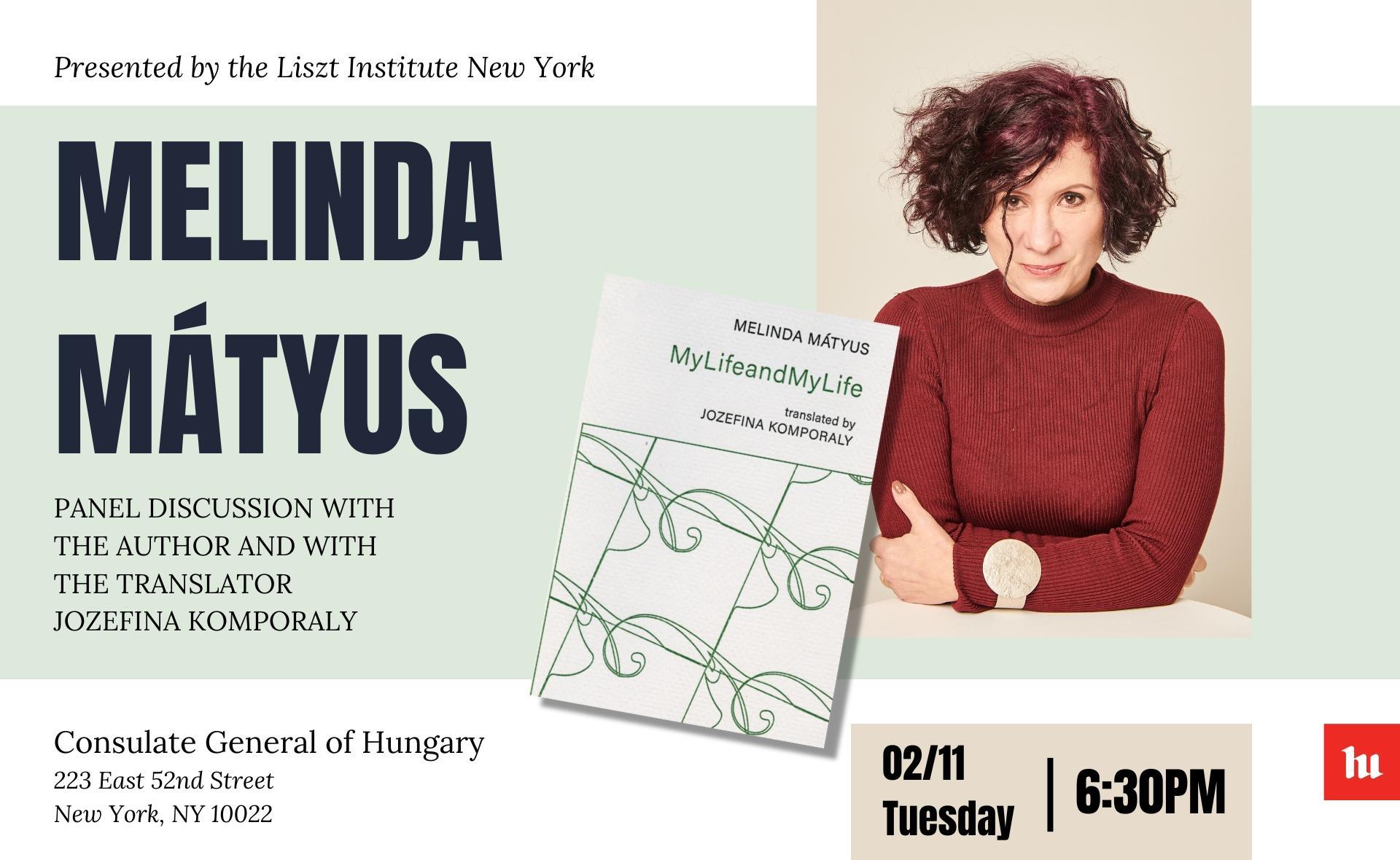223 E 52nd Street, NY 10022
The Liszt Institute New York is delighted to host an exciting book launch and panel discussion on February 11, 2025 at 6:30PM at the Consulate General of Hungary in New York showcasing the works of Hungarian-Romanian author Melinda Mátyus, translated by London-based translator Jozefina Komporaly and published in the United States by Ugly Duckling Presse.
Throughout the evening, attendees will enjoy excerpts from Melinda Mátyus’s intriguing and thought-provoking writings, especially her volume MyLifeandMyLife and prose collection Inkább az enyém followed by a captivating panel discussion featuring the author and translator themselves, moderated by the Liszt Institute New York.

Image: Jelenkor Publishers
About the book
MyLifeandMyLife is one of the strongest pieces of experimental fiction published in Hungarian in recent years. Kossuth Prize-winning author András Visky hailed Melinda Mátyus as a major discovery for the Hungarian literary scene, and as someone whose politically urgent and sensitive work has a potential universal appeal that transcends geographical and lingusitic boundaries.
Mátyus writes in bold and deeply touching ways about perfectly ordinary contemporary women, from women’s own perspective, and her protagonists examine womanhood in a variety of manifestations and configurations. MyLifeandMyLife is rooted in a personal memory going back to the author’s childhood, braided with the trope of sexual exploitation and its potential repercussions in Western culture. Mátyus zooms in on the loneliness of the socially ostracised woman and is preoccupied with the psychological makeup of those experiencing confinement and forced captivity.
In the text, a kept woman, who is deeply in love with the man who essentially holds her prisoner and deprives her of freedom, expresses her most intimate feelings through paintings. This strategy offers an avenue for the exploration of parallel dilemmas and experiments: the articulation of feelings through language, and the possibilities of getting to grips with visual arts by way of linguistic means. Mátyus points out that she was particularly fascinated by views that consider visual art a form of ’solitary art’, and by ways of integrating the pictorial into the body of literary texts. She is keen to tease out whether paintings can be transformed into narrative storylines through the medium of linguistic signs, and whether the various art forms can blur into one another.
About author Melinda Mátyus
Melinda Mátyus (born 1970) is a theatre critic and author of fiction, writing in Hungarian and based in Romania. She studied theology and comparative literature, and is active as a Calvinist pastor. Her deeply original voice has garnered important professional recognition and catapulted her to some of the most important Hungarian literary journals, such as Litera, szifonline.hu, Jelenkor, Pannon Tükör and Látó. She was a recipient of the Látó Award for fiction in 2020 and co-authored the volume Az ember tragédiája/The Tragedy of Man, edited by András Visky (Koinónia, 2021). Her first publication in book form was MyLifeandMyLife (translated by Jozefina Komporaly for Ugly Duckling Presse, 2023), while her Hungarian debut, the volume of fiction Inkább az enyém, was published in Hungarian by Jelenkor in Budapest in 2024. The prose collection Inkább az enyém was selected by literary critics for the "Minimum Eleven," a list compiled from the year’s best literary publications.

About translator Jozefina Komporaly
Jozefina Komporaly lectures in perfromance at the University of the Arts London and translates from Hungarian and Romanian into English. She is editor and co-translator of the drama collections How to Explain the History of Communism to Mental Patients and Other Plays (Seagull Books, 2015), András Visky's Barrack Dramaturgy: Memories of the Body (Intellect, 2017) and Plays from Romania: Dramaturgies of Subversion (Bloomsbury, 2021), and author of numerous publications on translation and adaptation, including the monograph Radical Revival as Adaptation (Palgrave, 2017). Her translations have appeared in Asymptote, Hungarian Literature Online, Index on Censorship, Modern Poetry in Translation, Poet Lore, The Baffler, Words without Borders, and World Literature Today, and have been staged by Foreign Affairs in London and Theater Y and Trap Door in Chicago. Recent translations include The Glance of the Medusa by László F. Földényi (Seagull Books, 2020), Story of a Stammer by Gábor Vida (Seagull Books, 2022) and Home by Andrea Tompa (Istros Books, 2024 – winner of a PEN Translation grant and longlisted for the Dublin Literary Award). She is a member of the UK Translators’ Association.

